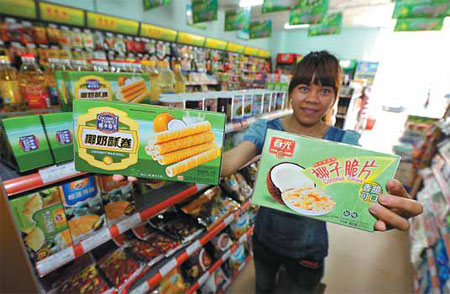Li urges to keep economy growing
|
A saleswoman at a convenience store in Haikou, Hainan province, shows snacks similar to those bought by Premier Li Keqiang on Friday when he visited the store. They cost 19 yuan ($3.05). Luo Yunfei / China News Service |
Premier calls for pragmatic policies rather than stimulus
Premier Li Keqiang urged governments not to underestimate current economic difficulties and to be "proactive" with "effective policies" when targeting problems that threaten to hold the Chinese economy to its slowest quarterly growth since 2009.
On a fact-finding trip on Friday to Haikou, capital of Hainan province, Li told local officials that maintaining economic expansion will be arduous and local governments must "rise to the occasion" and be "pragmatic" when issuing policies that motivate demand and keep the economy growing reasonably well.
Li visited Hainan - the country's largest special economic zone - amid estimates that the world's second-largest economy is expected to expand by about 7.3 percent in the first quarter of the year - its weakest showing since early 2009.
The reasonable growth range, a benchmark for Li to decide whether to issue stimulus policies, is a GDP increase of about 7 percent with inflation no higher than 3.5 percent.
Before going to Haikou, Li dismissed speculation that the central government will issue massive short-term stimulus policies, easing concerns that authorities may again opt for a massive stimulus package as it did in 2008. The move led to severe overcapacity and structural problems.
"A growth rate under this year's 7.5 percent target is acceptable as long as sufficient employment is ensured, and the government has prepared enough options to respond to any risks and is capable of maintaining economic growth at a reasonable range," the premier said in an earlier speech.
In Haikou, Li asked about the local export and import situation as he visited Haikou Harbour Container Terminal Co Ltd. March's international trade in China, the world's top trader, reported a decline of 9 percent to $332.5 billion.
Zhang Chenhui, the manager of the company's ferry business, said travel and trade in Haikou have both increased in the first quarter.
"Although exports and imports contracted, the trade of tropical fruits and other local specialties with interior provinces have increased," he said.
The premier said the country still has great potential for development since the enormous potential of domestic spending has not been tapped and can support the economy once it has been.
Haikou Harbor is one of China's 25 major coastal ports and an important gateway to countries of the Association of Southeast Asian Nations.
Trade with ASEAN countries is the fastest-growing part of Haikou Harbor's imports and exports, comprising one-quarter of the volume with an increase of 62.3 percent last year.
Li also looked at how the Haikou Bureau of Commercial and Industry Administration has cut red tape for business startups, and he visited an ecological conservation area that has the country's largest tidal mangrove forest.
Chen Zhiwu, a professor of finance at Yale University, said China is still trying to reverse the damage that the 2008 stimulus package did to its economy, and local governments should be cautious when working out "fine-tuning" policies to tackle the current difficulties.
Some measures are needed, but one should be careful not to overreact, he said. In addition, he warned that these fine-tuning policies should innovate businesses, instead of government-led investment, to rule out the possibility of overcapacity.
zhaoyinan@chinadaily.com.cn



















